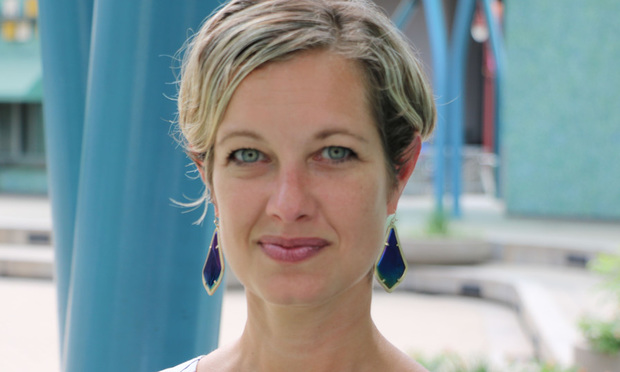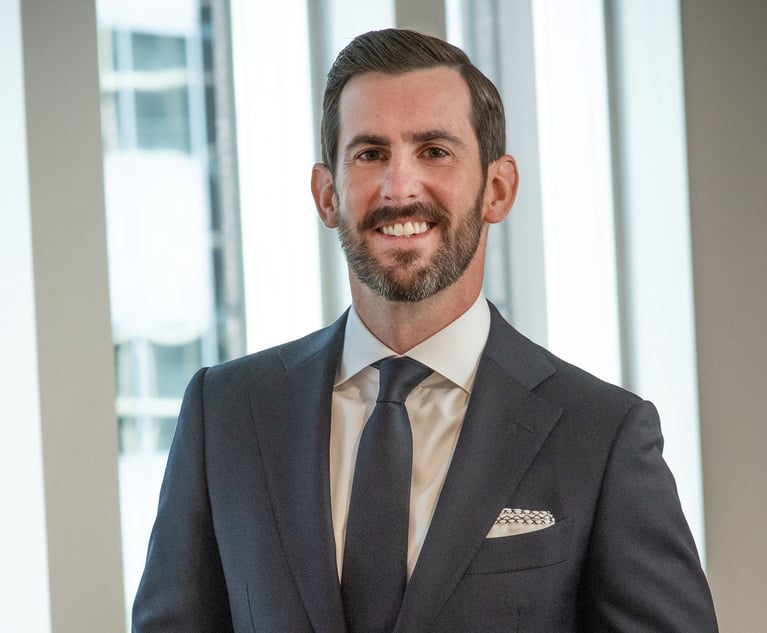Why Is Law Firm Innovation Failing? How to Push for Success
Recent news and awards indicate law firms are increasing their investments in innovation. Stories of recently launched innovation committees, R&D teams and idea labs routinely grace the pages of industry publications. Yet despite these investments, the trajectory of the industry as a whole seems to have remained largely unchanged. Why are innovation efforts by larger law firms failing to make a meaningful impact?
December 08, 2017 at 03:36 PM
5 minute read

Smart Strategy
Recent news and awards indicate law firms are increasing their investments in innovation. Stories of recently launched innovation committees, R&D teams and idea labs routinely grace the pages of industry publications. Yet despite these investments, the trajectory of the industry as a whole seems to have remained largely unchanged. Why are innovation efforts by larger law firms failing to make a meaningful impact?
The emphasis of the majority of innovation efforts in today's law firms is on idea generation— bringing together smart people to catalog all of the ways in which the firm can respond to changes. While idea generation is vital, it lacks the impact of taking action. Corporate entities as noteworthy as Disney, Ogilvy, Microsoft and Coca Cola have shuttered their innovation labs in recent years. Why? They simply don't work. In fact, according to a CapGemini report from 2015, an expert predicted 90 percent of innovation labs fail.
The think tank approach often focuses on major shifts—artificial intelligence, Millennials, lawyer robots—at the expense of a very real alternative—small change, or as Adi Gaskell refers to it in his Forbes article, “humdrum innovation.” While Gaskell's examples focus primarily on process improvement concepts, the underlying message is clear. “Go big or go home,” is not a mantra for leading change. Small improvements in what law firms engage in every day—from the delivery of legal services to the way they communicate with clients to how they attract talent— can add up to meaningful impact.
To encourage any type of innovation, including the “humdrum” kind, law firms must simultaneously empower their professionals to make decisions, incorporate voices from outside the firm and acknowledge and reward incremental improvements. Three fundamental elements must be in place to accomplish these objectives:
- A culture that supports experimentation (or exploration) and endows its people—not just its partners—with the authority and encouragement to execute ideas;
- A set of clear, concise key performance indicators (KPIs) that reflect what the firm most values (Hint: if the firm still emphasizes number of billable hours over profitability, realization or client satisfaction expect little in the way of increased efficiency or stronger long-term performance); and
- Inclusion of external influencers, whether clients, industry experts or third-party partners
Few firms are approaching innovation through the establishment of these essential ingredients —culture KPIs and the voice of the client—thereby, (often unwittingly) undermining their efforts. Innovation demands law firms create not just an environment conducive to the development of ideas, but also one able to embrace and act upon those ideas. CLOC, in its inception and dialogue with law firms, has the potential to create a collaborative platform on which greater innovation is possible. Yet for many law firms, the struggle will be internal. According to MIT Professor Luis Perez-Breva, author of ”Innovating: A Doer's Manifesto,” who works routinely with entrepreneurs and is an advocate of a less formulaic approach to innovation there is tremendous value in being “productively wrong.”
Somehow, when you grow into being an adult, you've learned so much and you've been taught so much that it feels like being wrong is an anathema. But it turns out that if you're really innovative—if you're really doing something new—you want to be wrong as many times as possible.
For law firms, this means letting go of the gold standard of perfection and replacing it with one of exploration, and cultivating a willingness to allow team members to be wrong—in the right ways. Re-focusing law firm innovation on small changes, rather than wholesale rehabilitation of long-standing traditions, can help to release the fear and uncertainty that often accompanies new ways of doing things. Small change also constrains the impact of “being wrong,” to allow for greater experimentation and more, not fewer, attempts to make an impact.
At the same time, allowing space and time for what Perez-Breva describes as exploration—the iterative process of entertaining various options and possibilities without constraints or preconceived notions—is equally vital to the act of innovating. Rather than focusing on a single idea or solution, Perez-Breva encourages continuous development and improvement through the incorporation of feedback and inputs.
In other words, innovation is a process, a way of being and approaching problems, rather than a step-by-step recipe. For law firms to truly “innovate,” they must change their mindset. Rather than a program or initiative designed to ignite new ideas, a systematic and holistic shift in thinking is needed. Embrace “humdrum innovation.” Encourage professionals across the firm to be “productively wrong.” Measure and celebrate incremental improvements in what matters most. And explore, most of all, explore.
Marcie Borgal Shunk is president and founder of The Tilt Institute, a firm dedicated to unveiling new perspectives on law firm growth through intelligence, innovation and intuition. She specializes in helping law firm leaders make better, data-driven business decisions.
This content has been archived. It is available through our partners, LexisNexis® and Bloomberg Law.
To view this content, please continue to their sites.
Not a Lexis Subscriber?
Subscribe Now
Not a Bloomberg Law Subscriber?
Subscribe Now
NOT FOR REPRINT
© 2025 ALM Global, LLC, All Rights Reserved. Request academic re-use from www.copyright.com. All other uses, submit a request to [email protected]. For more information visit Asset & Logo Licensing.
You Might Like
View All
With New Civil Jury Selection Rule, Litigants Should Carefully Weigh Waiver Risks
6 minute read


Government, May I Fix My GST Mistake? Regulations Offer Guidance on Generation-Skipping Tax Exemption Allocation Relief
9 minute readTrending Stories
- 1Settlement Allows Spouses of U.S. Citizens to Reopen Removal Proceedings
- 2CFPB Resolves Flurry of Enforcement Actions in Biden's Final Week
- 3Judge Orders SoCal Edison to Preserve Evidence Relating to Los Angeles Wildfires
- 4Legal Community Luminaries Honored at New York State Bar Association’s Annual Meeting
- 5The Week in Data Jan. 21: A Look at Legal Industry Trends by the Numbers
Who Got The Work
J. Brugh Lower of Gibbons has entered an appearance for industrial equipment supplier Devco Corporation in a pending trademark infringement lawsuit. The suit, accusing the defendant of selling knock-off Graco products, was filed Dec. 18 in New Jersey District Court by Rivkin Radler on behalf of Graco Inc. and Graco Minnesota. The case, assigned to U.S. District Judge Zahid N. Quraishi, is 3:24-cv-11294, Graco Inc. et al v. Devco Corporation.
Who Got The Work
Rebecca Maller-Stein and Kent A. Yalowitz of Arnold & Porter Kaye Scholer have entered their appearances for Hanaco Venture Capital and its executives, Lior Prosor and David Frankel, in a pending securities lawsuit. The action, filed on Dec. 24 in New York Southern District Court by Zell, Aron & Co. on behalf of Goldeneye Advisors, accuses the defendants of negligently and fraudulently managing the plaintiff's $1 million investment. The case, assigned to U.S. District Judge Vernon S. Broderick, is 1:24-cv-09918, Goldeneye Advisors, LLC v. Hanaco Venture Capital, Ltd. et al.
Who Got The Work
Attorneys from A&O Shearman has stepped in as defense counsel for Toronto-Dominion Bank and other defendants in a pending securities class action. The suit, filed Dec. 11 in New York Southern District Court by Bleichmar Fonti & Auld, accuses the defendants of concealing the bank's 'pervasive' deficiencies in regards to its compliance with the Bank Secrecy Act and the quality of its anti-money laundering controls. The case, assigned to U.S. District Judge Arun Subramanian, is 1:24-cv-09445, Gonzalez v. The Toronto-Dominion Bank et al.
Who Got The Work
Crown Castle International, a Pennsylvania company providing shared communications infrastructure, has turned to Luke D. Wolf of Gordon Rees Scully Mansukhani to fend off a pending breach-of-contract lawsuit. The court action, filed Nov. 25 in Michigan Eastern District Court by Hooper Hathaway PC on behalf of The Town Residences LLC, accuses Crown Castle of failing to transfer approximately $30,000 in utility payments from T-Mobile in breach of a roof-top lease and assignment agreement. The case, assigned to U.S. District Judge Susan K. Declercq, is 2:24-cv-13131, The Town Residences LLC v. T-Mobile US, Inc. et al.
Who Got The Work
Wilfred P. Coronato and Daniel M. Schwartz of McCarter & English have stepped in as defense counsel to Electrolux Home Products Inc. in a pending product liability lawsuit. The court action, filed Nov. 26 in New York Eastern District Court by Poulos Lopiccolo PC and Nagel Rice LLP on behalf of David Stern, alleges that the defendant's refrigerators’ drawers and shelving repeatedly break and fall apart within months after purchase. The case, assigned to U.S. District Judge Joan M. Azrack, is 2:24-cv-08204, Stern v. Electrolux Home Products, Inc.
Featured Firms
Law Offices of Gary Martin Hays & Associates, P.C.
(470) 294-1674
Law Offices of Mark E. Salomone
(857) 444-6468
Smith & Hassler
(713) 739-1250





